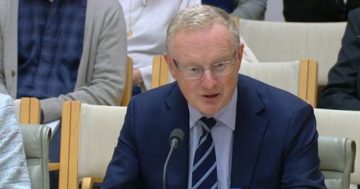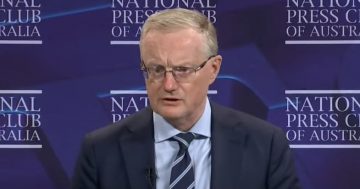
When the Reserve Bank announced it was dropping the interest rate and the banks, to some degree, followed suit, there was some joy out there in the community.
The economists said that softening the fiscal environment was good for us. They said that the drop in the value of the dollar was good for trade and that it should fall further.
But hang on… While I’m no economist, I reckon I have to pay more for everything because what I could get for a dollar yesterday, I have to pay more than a dollar today. In simple terms, my dollar isn’t worth as much.
One good aspect though is that for people wanting to get into their own homes or those on crippling variable mortgages, they’re going to be a little bit better off each month. So for the great Aussie dream, it is good news. When I was a young parent, with a mortgage of 17 per cent, any reduction was meaningful in our lives.
Have you noticed how the prices for overseas goods like clothes and white goods have gone down because the dollar has dropped? Me neither!
Drops in interest rates appear to impact three parts of our community: the working young; the middle group where salaries and wages are ok, the finalising of mortgages is in sight, disposable and discretionary income is ok and the quality of life is reasonably good; and the retired cohort either on fixed pensions of self-funded retirees.
For the purpose of this view, I’ve ignored those on high incomes and those below the poverty line dependent on pensions, because the rich don’t think about prices (they just get what they want when they want it) and the people on benefits never have enough disposable income.
I’m a bit mystified as to how people are better off when they have a lower mortgage repayment eaten up by deterioration in the purchasing power of the mighty dollar. One would hope that they come out at least even and maybe a bit in front. This seems to be the lot of the working young.
The middle cohort are usually in a financial situation where they can ride out the fluctuations in fiscal fortune and cut their cloth or expand it out whenever the economic fortunes wax and wane. When I was in mid-career in the public service, I didn’t take that much notice of the global financial situation, I didn’t take much notice of how the dollar went up or down, I just noted that bread, petrol and smokes went up every year. That was how it was but my life style didn’t change all that much and I wasn’t on a high income either.
Now that I’m in my advanced years I associate with a number of people who are self-funded retirees. Many of them are articulate, well read and their views are to be taken seriously. I also see from time to time seniors’ journals and newsletters discussing the lot of retirees of both types.
Older citizens are either on the pension, live off superannuation at an income level considerably less than they had when in the workforce, or spend the returns on investments such as SMSFs or the share market. Some live off the returns on real estate investment, but not many.
Those on the age pension are at the mercy of the government of the day when it comes to the cost of living adjustment. Setting the pension at CPI increases or AWE increases still means pensioners don’t have any control over their pensions, the government of the day does.
Superannuants are in a similar position to “the pensioners”. The schemes dictate the percentage rise each half year. The others depend heavily on the market place where interest rates are pivotal. If the rates stay low, the income of the self-funded retiree stays low.
The interesting bit now is that we have an increasing ageing cohort who are living longer and have reasonably high health costs. Often their lifestyle is less expensive but their health costs are significant. Funnily, this same situation faces the working young families. Their lifestyle is less expensive because they don’t have a lot of disposable income and the costs of raising children (how I hate that term – it’s like cattle) are high and also have attendant high health costs.
But the governments of the day trumpet the benefits of low interest rates which are helping the young working families but evade the truth of the deterioration of quality of life for the retiree cohort. I don’t know where the middle ground is and where all three cohorts can get a fair share.
Perhaps I should have studied economics instead of defence and strategic studies, politics and history.





















